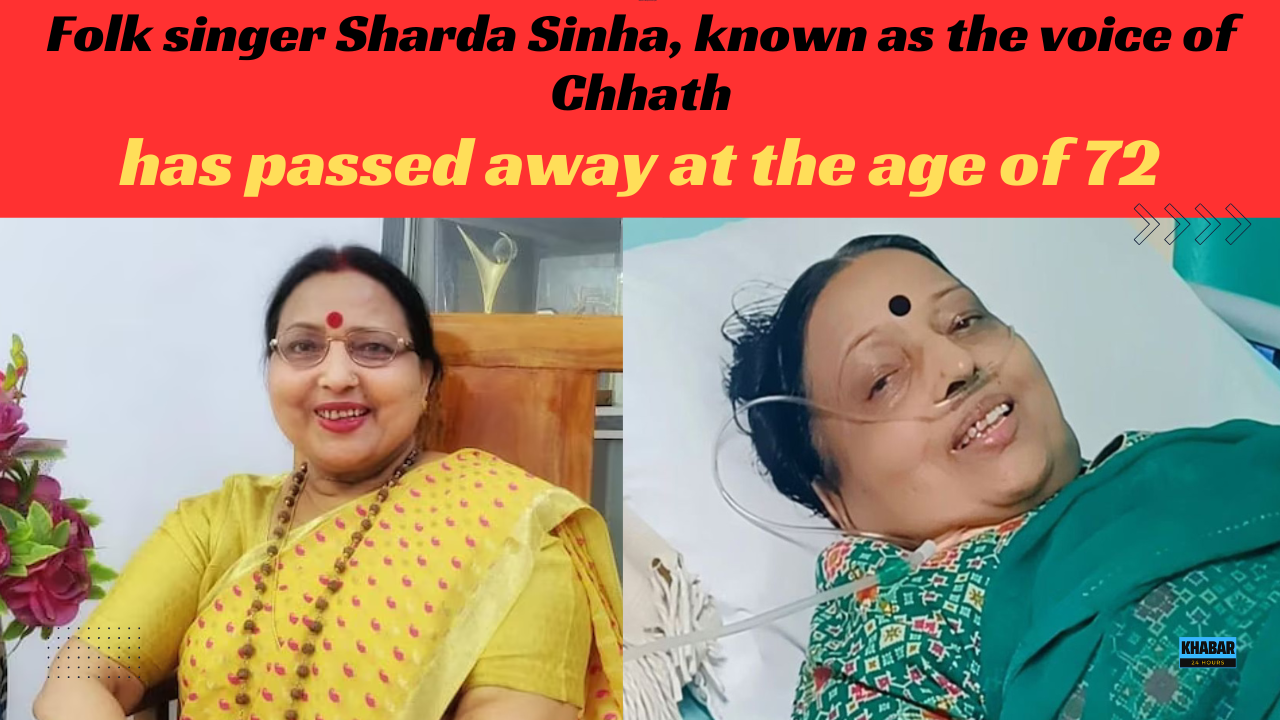Her songs resonated with the legacy of generations of folk singers who preceded her, with a voice that was both earthy and full of nostalgic warmth. Known as the ‘Begum Akhtar of Mithila,’ she was the voice behind Chhath Puja and countless celebrations, both within the region and beyond.

Folk singer Sharda Sinha, 72, passed away on Tuesday night (November 5, 2024), while undergoing treatment at AIIMS Delhi.
An AIIMS official reported that Sharda Sinha passed away at 9:20 p.m. due to refractory shock caused by septicemia. Sinha was beloved for her folk songs like “Kartik Maas Ijoriya” and “Koyal Bin,” along with Bollywood hits “Taar Bijli” from Gangs of Wasseypur – II and “Babul” from Hum Aapke Hain Koun.
Padma Bhushan awardee Sharda Sinha, renowned for her folk songs in Bhojpuri, Maithili, and Magahi, had been on ventilator support following complications from multiple myeloma, a type of blood cancer. She was admitted to the intensive care unit at the Institute Rotary Cancer Hospital (IRCH), AIIMS’s cancer institute, in October 2024.
Earlier, AIIMS had shared on X: “Renowned folk singer Smt. Sharda Sinha is admitted to AIIMS, New Delhi, for treatment. Hon’ble Prime Minister Narendra Modi is closely monitoring her condition and has maintained direct contact with the treating doctors, conveying his prayers for her health and speedy recovery through the medical team.”

Later in the day, Union Minister Giriraj Singh visited the ailing artist at AIIMS. On Monday evening, November 4, 2024, Food Processing Minister and Hajipur MP Chirag Paswan also visited the hospital.
Known as the “Bihar Kokila,” Supaul-born Sharda Sinha gained fame in Bihar and parts of eastern Uttar Pradesh for her folk songs, often performed during Chhath Puja and weddings.
Her popular tracks include “Chhathi Maiya Aayi Na Duaariya,” “Kartik Maas Ijoriya,” “Dwar Chekai,” “Patna Se,” and “Koyal Bin.”

The singer had been fighting multiple myeloma since 2017.
Prime Minister Narendra Modi expressed sorrow over Sharda Sinha’s passing, calling her death an irreparable loss to the music world.
In a post on X, Prime Minister Modi noted the immense popularity of Sharda Sinha’s folk songs in Maithili and Bhojpuri, especially her enduring songs for Chhath, a festival of deep faith. He extended condolences to her family and admirers, remarking that her songs would resonate for generations.
Known as the “Voice of Chhath” and “Begum Akhtar of Mithila,” Sinha’s music captured the spirit of countless folk traditions. Her voice, rich and nostalgic, became the soundtrack for Chhath Puja and many celebrations, both within her region and beyond.
Sharda Sinha, the celebrated folk singer known for her powerful connection to the cultural roots of Bihar and eastern Uttar Pradesh, passed away on November 5, 2024, just four days after her 72nd birthday. Her death, which coincided with the start of Chhath celebrations—a festival she had long been associated with—felt like a poignant turn of fate to millions who cherished her voice during this time of year.
Known as the “Bihar Kokila” and “Begum Akhtar of Mithila,” Sinha’s music spanned more than five decades, deeply rooted in Bhojpuri, Maithili, and Magahi folk traditions. Her timeless songs for Chhath Puja and weddings resonated across generations. She had released another song for this Chhath, despite her deteriorating health, adding to her legacy that has captivated both rural and urban audiences.
Sinha was a trained classical musician who seamlessly wove folk traditions into her music, making her one of the most revered voices in regional Indian music. Her songs, including “Chhathi Maiya Aayi Na Duaariya,” “Kartik Maas Ijoriya,” and “Patna Se,” became anthems of Bihari culture. Bollywood also embraced her talent, with songs like “Taar Bijli” in Gangs of Wasseypur-II, “Babul” in Hum Aapke Hain Koun, and “Kahe Toh Se Sajna” in Maine Pyar Kiya expanding her reach.

Her career began in 1971 with the Maithili song “Dularua Bhaiya,” and she gained international recognition after her tribute to poet Vidyapati in 1983. She was honored with numerous awards, including the Sangeet Natak Akademi Award, the Padma Shri, and the Padma Bhushan, and her impact led to accolades such as the Bihar Ratna and Mithila Vibhuti Samman.
Beyond her music, Sinha was also an esteemed cultural ambassador, performing worldwide and representing the folk heritage of Bihar. She was a top-grade artist with All India Radio and served as a professor in Bihar’s Women’s College, Samastipur, for over four decades. She embraced modern platforms like YouTube and Instagram, where she connected with her fans through songs, tributes, and festive messages.
Her family, including her children Vandana and Anshuman, endured a recent loss with the passing of her husband, Braj Kishore Sinha. Anshuman now manages the Sharda Sinha Art & Culture Foundation, dedicated to preserving Bihari and northern Indian culture.
Sinha’s music continues to be celebrated, ensuring that her voice—rooted deeply in her people’s traditions—will endure, forever intertwined with the festivals and moments she so passionately sang about.


